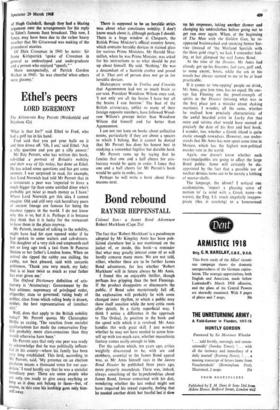Ethel's peers
LORD EGREMONT
The Aristocrats Roy Perrott (Weidenfeld and Nicolson 42s)
'What is that for?' said Ethel to Fred, who had a golf tee in his hand.
Fred said that you put your balls on it and then drove off. 'Oh, I see,' said Ethel. 'Ask a silly question and you get a silly answer.'
Mr Roy Perrott, who has written this book, sub-titled a portrait of Britain's nobility and their way of life today, has done an Ethel. He has asked some questions and has got some answers. I was surprised to read, for example, that Lord Norwich had told Mr Perrott that in a restaurant a peer was 'expected to leave a much bigger tip than some untitled diner who's probably got twice as much money as I have.' Where Lord Norwich got this idea I cannot imagine. Old and still very rich hereditary peers of ancient lineage are famous for being the meanest tippers in the world. I do not know why this is so, but it is. Perhaps it is because they think that it is lucky for the restaurant to have them in the place anyway.
Mr Perrott, instead of talking to the nobility, might have had his eyes opened wider if he had spoken to some waiters and cab-drivers. The daughter of a very rich and umpteenth earl not so long ago took a taxi from St Pancras Station to her father's London home. When on arrival she tipped the cabby one shilling, the cabby, not best pleased, said with sarcastic politeness, 'Thank you very much, my lady; that is at least twice as much as your father has ever given me.'
The Oxford Dictionary definition of aris- tocracy is 'Aristocracy: Government by the best citizens; supremacy of privileged order, oligarchy; state so governed; ruling body of nobles; class from which ruling body is drawn, nobles; the best representatives of (intellect etc).'
Well, does that apply to the British nobility today? Mr Perrott quotes Mr Christopher Hollis as saying, 'The reaction from socialist egalitarianism has made the conservative Eng- lish probably more class-conscious than they would otherwise have been.'
Mr Perrott says that only one peer was ready to acknowledge that he was politically influen- tial in his county—where his family has been very long established. This lord, according to Mr Perrott, said, 'My presence on an election platform means a thousand votes for our can- didate: I need hardly say that he was a socialist hereditary peer. There are some people who are only too ready to give away anything so long as it does not belong to them—but, of Course, in this case his lordship gave only him- self away. There is supposed to be an heraldic strict- ness about what constitutes nobility. I don't know much about it, although perhaps I should. There is a huge window at Chequers, the British Prime Minister's official country house, which contains heraldic devices in stained glass for various Prime Ministers. Mr Harold Mac- millan, when he was Prime Minister, was asked for his instructions as to what should be put up about himself. He said. 'Nothing.' He was a descendant of a Scottish crofter and proud of it. That sort of person does not go in for heraldic devices.
Shakespeare wrote in Troilus and Cressida that Agamemnon had not so much brain as ear-wax. President Woodrow Wilson once said, 'I not only use all the brains I have but all the brains I can borrow.' The best of the British aristocracy, unlike so many of their foreign opposite numbers, have followed Wood- row Wilson's precept better than Woodrow Wilson did himself and far better than Agamemnon.
I am not too keen on books about collective nouns, particularly if they are about a species to which I belong. But it cannot be denied that Mr Perrott has done his honest best in studying a somewhat fugitive but durable herd.
Mr Perrott sums up by saying that he fancies that one and a half cheers for aris- tocracy would be quite in order. I fancy that one and a half cheers for Mr Perrott's book would be quite in order, too.
Perhaps he will write a book about Free- masons next.






































 Previous page
Previous page